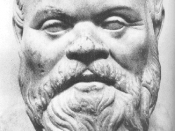Utilitarianism is a version of moral philosophy, initiated by Jeremy Bentham and refined and popularized by John Stuart Mill, which, true to its etymology, is concerned above all with the usefulness of human activity. Utilitarianism has been one of the most influential of ethical theories, and the one most widely used in ordinary 'common-sense' decisions. Jeremy Bentham (1748-1832) argued that an action should be judged, not simply on the happiness it appeared to offer the person who performed it, but according to its ability to benefit everyone involved. He thought that everyone's interests should be considered equally, 'each to count as one and no one as more than one' , and did not consider one form of happiness to be more important than another form of happiness.
The reference, however, is more specifically to the utility and usefulness of human actions to produce happiness, which comes to be equated with pleasure or the satisfaction of desires.
Though typical of modern man's mentality, such a philosophy is not unique to modern times. Epicureanism had something similar to say in ancient Greece. Based on these presuppositions, the utilitarians make the guiding principle of ethics the maximization of happiness. Therefore, the actions which will produce the greatest happiness of the greatest number are the right ones to be done and those which produce pain are to be avoided or in other words "everyone should perform that act or follow that moral rule that will bring about the greatest good (or happiness) for everyone concerned." Almost from the start, many obvious difficulties were encountered by its adherents, which have led to continuous revisions. These different versions of the theory have resulted in other names being given to it, such as 'consequentialism' and 'proportionalism', but the continual revisions can still be grouped under the heading...


